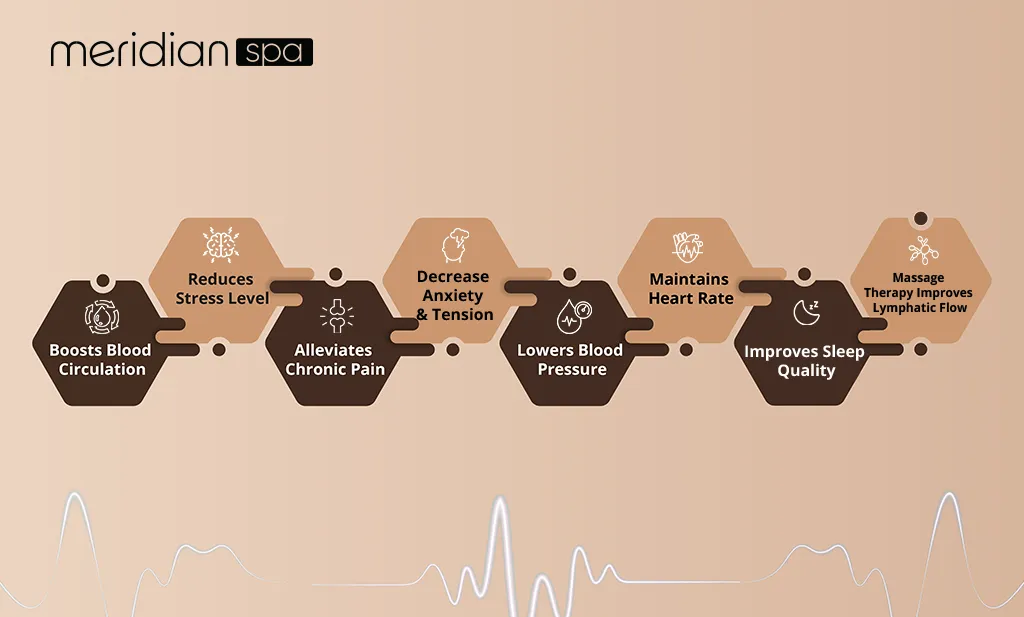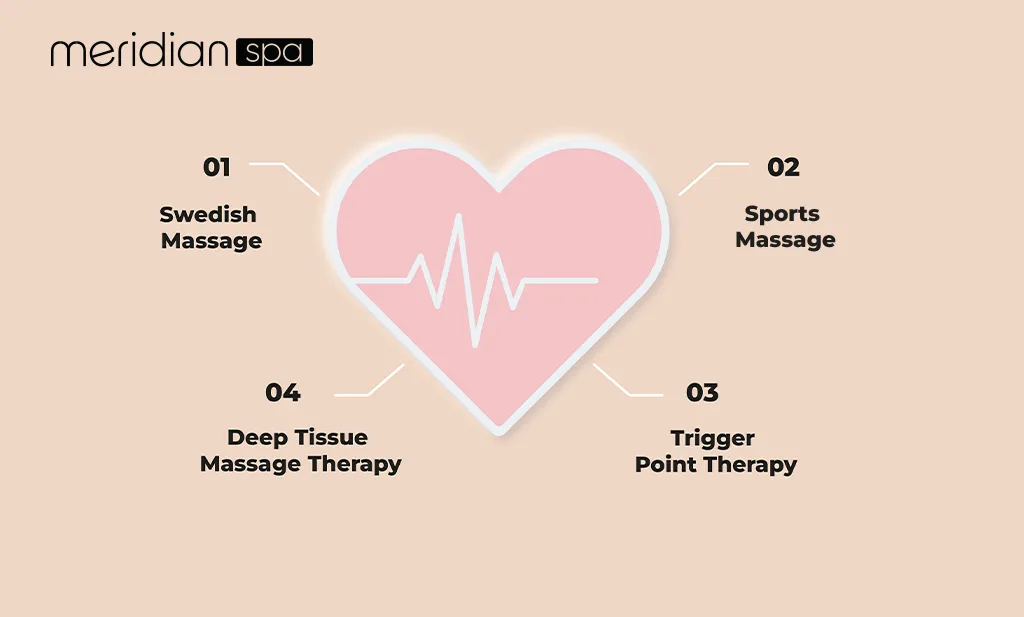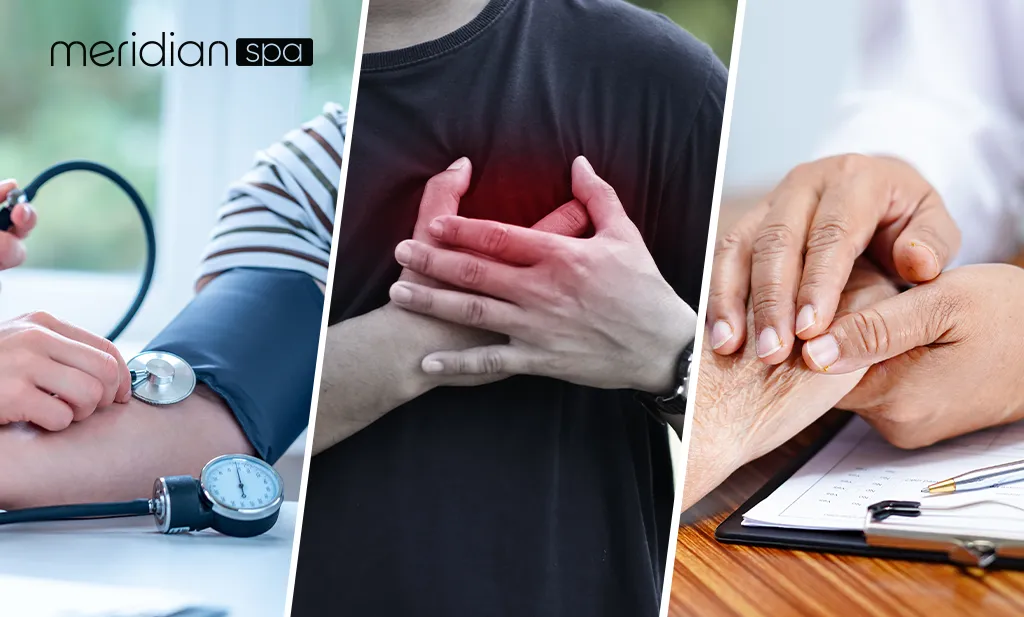Did you know massage can improve your heart and cardiovascular system? Well, it is! In reality, massage is the most admired treatment that provides benefits beyond mental and physical relaxation. After lots of research, it is evident that regular massage reduces stress, improves blood circulation, and increases the overall body’s immunity. Furthermore, it improves posture, decreases muscle tension, and boosts energy levels.
In the long run, it has multiple spillover benefits. It enhances the quality of sleep, lessens anxiety and despair, etc. However, the most notable benefit is that it promotes cardiovascular health.
Is It Safe to Have a Massage with a Heart Condition?
You must be thinking about whether getting a massage with a heart condition is okay. So the answer is your doctor is the most knowledgeable person here, who can examine and answer this question! It is the right way before deciding on any course of treatment for a chronic illness, including cardiovascular health, arrhythmia, or heart failure. Always consult with your physician.
He could advise on the number of treatment options because they will have a deeper understanding of the patient’s conditions and grasp of knowledge on illness. Although you cannot physically touch the heart, massaging other parts of the body will promote heart health. Hence, generally, getting massage therapy for cardiovascular health is safe. Still taking precautions for some of the prevailing health conditions will help a lot, like swelling in legs, having high blood pressure, etc.
The Advantages of Massage Therapy for Cardiovascular Health
Even if you do not prefer massage therapy, it is important to understand its benefits for various heart conditions. Massage has shown huge benefits in improving heart health, especially in the recovery phase after heart surgery. Massage can help reduce stress, lower blood pressure, and improve circulation, all of which are beneficial for heart health.

1. Boosts Blood Circulation
According to intensive research, massage therapy can directly improve blood circulation by dilating the blood vessels. This further fosters a sense of relaxation and enhances the flow of oxidants through oxygen-rich blood. Proper blood circulation is vital for our heart and other organs to keep functioning, so it’s crucial for cardiovascular health.
2. Reduces Stress Level
One of the most quiet yet significant factors in heart disease is stress. Stress increases blood pressure and leads to cardiac illnesses like heart attacks. Meanwhile, massage therapy done with the soft hands of a therapist lowers stress hormones like cortisol. In addition, it induces the production of dopamine and serotonin. Altogether, it decreases the stress level and the chances of heart disease with increased relaxation.
Recommended Reading: Massage Therapy Benefits for a Healthy Stress Free Life
3. Alleviates Chronic Pain
Chronic pain can adversely affect cardiac problems and slow recovery from heart surgery. Massage therapy interrupts the pain cycles by increasing blood circulation and releasing natural painkillers (endorphins). Moreover, massage effectively decreases the tension of muscles that tighten around the sore areas.
4. Decrease Anxiety and Tension
Severe medical disorders like high blood pressure, coronary artery disease, and several other cardiac diseases are caused by high levels of stress and tension. Multiple studies indicate that massage therapy significantly decreases tension in body muscles, which leads to overcoming stress levels. Hence, it helps us combat depression and anxiety and supports our cardiac health.
5. Lowers Blood Pressure
High blood pressure is the most common risk factor for arrhythmias, heart attacks, and numerous other heart-related disorders. Enough evidence supports the idea that massage therapy effectively lowers systolic and diastolic blood pressure levels, which supports heart health and keeps blood pressure in check.
6. Maintains Heart Rate
A perfect massage experience will help you manage your heart rate by relieving the pressure required to pump blood throughout your body. As the massage progresses, your heart rate starts to slow down as blood pressure is lowered and blood circulation is enhanced. Moreover, as it dilates the blood vessels and improves the flow, it calms a racing heartbeat. That further promotes physical and emotional well-being while aiding balance in the body.
Recommended Reading: 8 Full Body Massage Secrets You Never Knew
7. Improves Sleep Quality
It is evident that sleep quality can dramatically affect heart health. People who have trouble sleeping are more likely to be obese, diabetic, and have high blood pressure—all of which are risk factors for heart disease. Getting frequent massages has been shown to enhance the quality of sleep by promoting relaxation in the mind and body. According to published research, massage therapy helps heart disease patients sleep better.
8. Improves Lymphatic Flow
Proper lymphatic flow plays a crucial part in the body’s proper functioning. It eliminates waste materials and toxins and provides nutrients. Massage therapy can enhance lymphatic flow, improving its performance and facilitating the detoxification process. In addition, it enhances the general well-being and helps the heart keep itself in the optimal condition.
Massage Techniques and Their Benefits for Heart Health
Massage therapy can aid in cardiac rehabilitation and help patients recover more rapidly from heart-related conditions or surgeries. However, massage therapy has lots of types depending on the techniques used, and each one of them has numerous benefits.

As a heart patient, one should be careful when choosing a massage technique. Let’s explore them to understand better which massage techniques are good for heart health and which are not. Although this is not an extensive list of massage techniques, they are known to be the most effective in benefiting patients.
1. Swedish Massage
Swedish massage is among the most well-liked and well-known massage therapies. Its goal is to relieve stress and relax the muscles in the body. In addition, Swedish massage promotes emotional well-being and aids in the control of blood pressure.
3. Deep Tissue Massage Therapy
Another most liked massage technique is deep tissue massage, which aims to relieve discomfort and toughness by focusing on the body’s deeper muscles. This can promote physical renewal and relaxation while also assisting with circulation problems. Altogether, this leads to better heart health.
4. Sports Massage
Designed particularly for athletes or anyone who exercises frequently, sports massage aids in the body’s pre- and post-exercise recovery. It can also promote better circulation and relieve tense muscles.
5. Trigger Point Therapy
It breaks and dissolves muscle adhesions and knots in places prone to stress and tension, which can improve heart health and blood flow. Concentrating on trigger points and facilitating their release helps relieve these problematic locations and enhance the range of motion.
After recovering from surgery, you should discuss your interest in massage therapy as a means of aiding in cardiac rehabilitation with your physical therapist. Also, you could schedule sessions with a certified massage therapist for more frequent massages that can help lower blood pressure and relieve stress.
Recommended Reading: Everything You Need To Know About Massage Treatment
Precautions Needed with Massage and Heart Health

Massage has been demonstrated to be beneficial for general health and cardiac health. People who are recovering from or at risk of developing cardiovascular disease can benefit from massage therapy. However, they must take precautions and safety measures.
There are several general considerations to think about before getting massage therapy, even if you do not have any specific heart-related condition. Which are:
High Blood Pressure Patients
As we have already mentioned, massage therapy is beneficial for high blood pressure because it significantly lowers blood pressure. Patients who have high blood pressure should check their blood pressure before getting massage therapy. Blood pressure fluctuations can result in low blood pressure symptoms such as headache, nausea, and fainting.
Heart Failure Patients
It is recommended to get massage therapy in a seated position for heart failure patients who may have trouble breathing. This will keep airflow unhindered and will not disturb their breathing. Additionally, get more massages on your hands, feet, and neck than on your back massage.
Heart attack Survivors
For patients recovering from cardiac attacks or surgery, massage treatment can help them heal quickly. It lowers cortisol, stress, and heart rates and stimulates healing. Although it could seem alluring to have only a massage to speed up healing, it is best to see a doctor to ensure all surgical wounds have healed before beginning the massage therapy.
Pacemaker or ICD patients
After getting an ICD or pacemaker, getting a massage is still safe as long as the doctor gives the go-ahead after healing surgical wounds. Moreover, it is crucial to ensure that it does not touch the area where it has been inserted.
Coronary artery diseases or Atrial Fibrillation
If you have abnormal heart rhythms, you might be prone to blood clots. Consult a physician to find out if massage therapy is safe for you. In addition, avoid getting massaged on the legs and lower body.
Stroke Patients
Since stroke is caused by bursts or clogged arteries in the brain, it is not a cardiac issue. Massage therapy can still help reduce muscle stress that results from contractures after a stroke.
Recommended Reading: Where to Find the Best Full Body Massage in London?
Conclusion
It is important to understand that we are clear here that massage therapy is the solution for heart health. It is very beneficial for improving physical and mental health and, more importantly, cardiac health. When combined with a nutritious diet, regular exercise, and any additional therapies the doctor prescribes, it functions best.
Lastly, massage therapy can provide a number of benefits, but it is important to make any decision with the guidance of your doctor. Hence, you will be able to achieve the best outcomes and maintain your cardiac health for years in this way.
